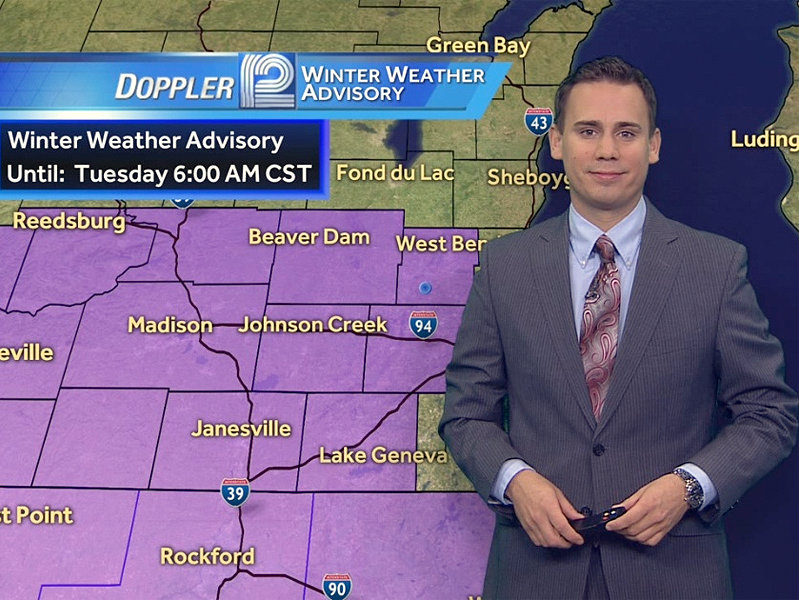Channel 12 meteorologist Chris Gloninger is the weatherman that's always smiling. You've seen him on WISN-TV News for about a year and a half now and he's got a great poker face. Whether the forecast is for 75 degrees and sun or -8 degrees and snow, Gloninger's got a grin.
He says it's in large part because he really and truly loves his job. But there's another reason, too. Find out what that is as two New York expats talk about weather in Milwaukee in this latest installment of Milwaukee Talks.
OnMilwaukee.com: Give us the Chris Gloninger story. Where are you from and what was your path to getting here?
Chris Gloninger: I grew up on Eastern Long Island, and went to study meteorology at Plymouth State University in New Hampshire.
After graduation, it took me about 8 years to get to Milwaukee with four stops along the way. My career started in Rochester, N.Y. – the snowiest location I've worked so far. I made a short stop in Albany as the weekend morning meteorologist – the economy crashed; the station went bankrupt and discontinued the weekend shows where I was meteorologist.
After a three-month job search flying around the country, I found a good fit in Saginaw/Flint, Mich. - I worked a 9 to 5 – which is unheard of in this business – and did weather Monday through Friday, including a variety of reporting assignments covering fires, floods and historic ice floes.
After a couple years, I moved back to Albany to be closer to home. There I covered historic flooding in upstate New York from Hurricanes Irene and Lee, and I was sent to New York City – Queens and Staten Island – to cover the aftermath of Hurricane Sandy. Then I was really lucky, and was given the opportunity to come to Milwaukee.
OMC: Were you always interested in the weather? If so, how did that lead you to broadcasting, as opposed to, say, a job at National Weather Service or some other kind of meteorology work?
CG: It all started in second grade. Hurricane Bob made landfall just east of my hometown on Eastern Long Island. Sailboats washed up onto the beaches, trees toppled over, and we were without power for a week. I loved it; my parents … not so much. After going to college for Atmospheric Science – another term for meteorology – I did well with the TV practicum offered at college, and that's how I found my way into TV.
Before my first job I interned in New York City with Sam Champion. There I was advised to finish college a semester early to get a jump on the job search ahead of the May graduates. When I got my first job in Rochester, it was with the understanding that I could go back to graduate with my class.
OMC: I want to talk about weather in Milwaukee, but first tell me more about landing here.
CG: Actually I wasn't able to see Milwaukee when I arrived. It was so foggy I couldn't see any of the high-rises lining Prospect, and I could only see the first 10 floors of the US Bank Building.
OMC: What did you think of the city when you first saw it?
CG: All joking aside, I thought it was a beautiful city – architecturally and because of it's proximity to Lake Michigan.
OMC: What struck you first and foremost about the city?
CG: The people are friendly. As soon as I was done interviewing: the cab driver, hotel concierge and waiter all were wishing me luck. That kindness and welcoming feeling have only become more evident over my first year and a half here.
OMC: Did you ask around at all among people you know in the business, "hey, what’s the scoop on Milwaukee?"
CG: Sure! It's a small business, so you normally ask your friends or friends of friends where the best place to live is. What's the No. 1 station in town? How important is weather in the market?
I couldn't be happier to work for one of the best companies in the TV business – and I work at a station where weather is No. 1. I love working at WISN; it’s a great group of people.
OMC: I sometimes hear that forecasting weather here is unique – unlike forecasting in other areas, presumably because of the Great Lakes, etc. Have you found that to be true?
CG: Professionally that's all I have forecasted for: Rochester, Albany, Saginaw and Milwaukee are very similar when it comes to forecasting – they're all influenced by the Great Lakes.
It's a lot more difficult than forecasting afternoon sunshine in Florida or heat in the southwest, but the challenge makes it enjoyable. It can be in the 50s at Veterans Park, but the temperature in Waukesha might be in the low 80s … that can make a forecast go horribly wrong, but it’s challenging, and I love the challenge.
OMC: Have you had a few stumbles along the way, learning the unique qualities of weather around here?
CG: My biggest stumble was with the fog during Summerfest. Not just forecasting stumbles which caused some event cancellations that could have gone on, but saying the word "fog." I say "fog" as a New Yorker would, and people picked up on it, and that week I had to say "fog" multiple times during the forecast. Not only did I pronounce it "wrong," the forecast went wrong, and the fireworks were cancelled several nights in a row.
OMC: When there are so many options out there for getting weather info – TV, radio, newspaper, weather web sites of all kinds – what does a team like yours offer that folks can’t really get anywhere else?
CG: Weather is about analyzing data, but there's an element of interpretation. National outlets, mobile apps and websites often times take raw data and turn it into a forecast because they don't have the time to make individual forecasts for Waldo or Waterford – just two random examples.
We are able to comb through data and tweak it before we make a forecast. I've only been here for a year and a half, but I've forecasted weather in the Great Lakes for nearly 10 years, and the rest of the weather team has been here for many years.
OMC: Speaking of which, you work alongside a couple really veteran weather folks in Sally Severson, Mark Baden and Jeremy Nelson; do you learn a lot from working alongside them?
CG: They're a terrific team. They were able to point out certain nuances in the region. For example, during the summer, there is a ridge to the west of Milwaukee – which you would never be able to see by looking at it with the naked eye – (so) if we have a westerly wind often times Milwaukee can be a couple degrees warmer than Waukesha. That's one of the first lessons Mark taught me.
OMC: Is it also a little daunting, or not so much?
CG: Not really. It definitely would be if it were your first job, but that's why you don't start out in the 34th largest market in the county. You need to make mistakes and learn how to talk through a verbal stumble without missing a beat on live television.
OMC: I’ve noticed that whatever the forecast is, you deliver it with a smile. Is that a sign of how much you love your job? Or are you just good at faking a smile when the sky is falling?
CG: Both. I can honestly say, living out my dream.
However, when the weather takes a nasty turn you can't display fear. I've covered the aftermath of an EF-4 tornado. I was in the heart of hurricanes Irene, Lee and Sandy. It's easy to be scared in those situations, but keeping a stiff upper lip and a smile can help the viewers get through a difficult situation.
OMC: OK, what are some of your favorite places in Milwaukee – bar, restaurant, etc.?
CG: The lake is my favorite place. As a kid I'd always go to the ocean to observe the weather. Living on one of the largest inland lakes in the world – it gives off the same awe inspiring effect. The water can be glass in the morning and by the afternoon 15 foot waves are crashing over the pier – there is no better place to experience the weather.
As far as a social scene, I enjoy hanging out on Brady Street. It's within a walk from my place on the East Side. Whether it's Jack's or the Garage, it's fun to watch a game at those places. Also Sobelman's is a great place right next door to the station.
I also enjoy cheese. Any type of cheese.
OMC: When you go out, do you get recognized yet? Do folks want a weather update while you’re waiting to get served at the bar?
CG: It usually starts off with a double take, and I always will smile. Having people come up to me is a perk of the job. It's great making new friends and hearing stories of winters from many years ago.
OMC: I know that you and I grew up rooting for the same team in the same stadium. Are we going to a Mets-Brewers game this year?
CG: Definitely! When New York is in town, it's tough going against your home team - but if the Brewers pull off a win, I can't say I'm disappointed. This is my adopted town and going to a Brewers game is one of my favorite past times in the summer.
Born in Brooklyn, N.Y., where he lived until he was 17, Bobby received his BA-Mass Communications from UWM in 1989 and has lived in Walker's Point, Bay View, Enderis Park, South Milwaukee and on the East Side.
He has published three non-fiction books in Italy – including one about an event in Milwaukee history, which was published in the U.S. in autumn 2010. Four more books, all about Milwaukee, have been published by The History Press.
With his most recent band, The Yell Leaders, Bobby released four LPs and had a songs featured in episodes of TV's "Party of Five" and "Dawson's Creek," and films in Japan, South America and the U.S. The Yell Leaders were named the best unsigned band in their region by VH-1 as part of its Rock Across America 1998 Tour. Most recently, the band contributed tracks to a UK vinyl/CD tribute to the Redskins and collaborated on a track with Italian novelist Enrico Remmert.
He's produced three installments of the "OMCD" series of local music compilations for OnMilwaukee.com and in 2007 produced a CD of Italian music and poetry.
In 2005, he was awarded the City of Asti's (Italy) Journalism Prize for his work focusing on that area. He has also won awards from the Milwaukee Press Club.
He has be heard on 88Nine Radio Milwaukee talking about his "Urban Spelunking" series of stories, in that station's most popular podcast.




.jpg)


